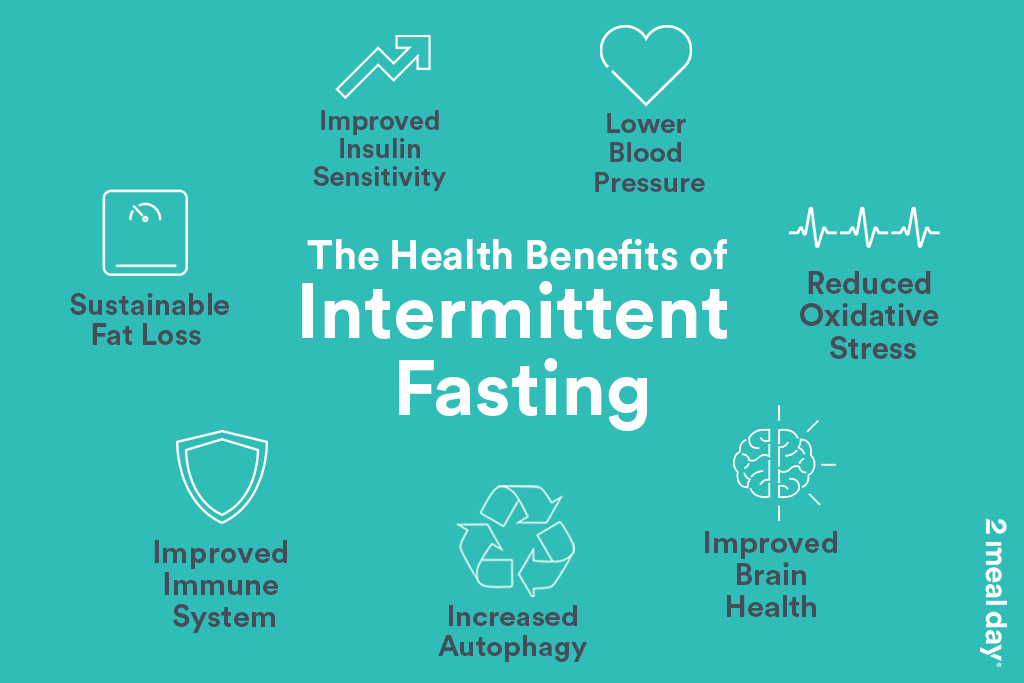
5 Proven Benefits of Intermittent Fasting and How to Do It
Unless you’ve been unplugged the last few years, you may have noticed a growing conversation surrounding the benefits of intermittent fasting and the best ways to do it.
Social media platforms have given us a way to connect, follow, and share the stories of those who inspire us. Millions of images and videos float around the internet sparking trends in the health and fitness industry.
Most of us want to be healthier and live longer, and a larger part of us strive to obtain the best quality of life possible.
So, we find ourselves clicking on blog posts or YouTube videos with titles such as: apple cider vinegar and weight loss, how to lose weight and keep it off, the benefits of a low carb dieting, or weightwatcher success stories.
What about intermittent fasting? Is it yet another “trend”? Or, is this something reputable and sustainable?
Come on, let’s face it… intermittent fasting sounds pretty extreme if you lack knowledge about how it really works.
The truth is that it’s not extreme at all, and intermittent fasting can have a positive impact on your health if done correctly.
It’s not nearly as bad as the mental picture that pops into your head when you think of abstaining from food for an extended time, and can easily become a lifestyle (and not a diet).
What is Intermittent Fasting?
First, we need to define intermittent fasting, so that we can all be on the same page when discussing the benefits of intermittent fasting.
It is certainly not a diet but should be thought of as an eating pattern that you are partially doing anyway. Didn’t know you were half-way doing it anyway? Keep reading.
Intermittent fasting alternates between periods of eating and fasting, but interestingly there is not an exhaustive list of foods you cannot eat.
Emphasis is placed on when you should eat foods, and not the types of food you should eat. So, let’s take a look at the variations of patterns and how intermittent fasting actually works.
3 Methods of Intermittent Fasting
There are several different intermittent fasting methods, and all of them involve allocating a part of the day or week for eating, and another part for fasting.
Most folks already fast every day, while they sleep. Intermittent fasting can be as simple as extending the fasting portion a bit longer.
For example, you can skip breakfast after a good night’s sleep, and start eating around noon. Technically, this means that you would be fasting for 16 hours a day but restricting your eating to an 8-hour window.
See my comparison of three methods below:
- The 16/8 Method is perhaps the most popular form of intermittent fasting. Many folks find this method the easiest to stick to over any other methods. The 16/8 method limits consuming foods and calorie-containing beverages to a set window of eight hours per day and abstaining from food for the remaining 16 hours.
- The 5:2 method involves eating normally 5 days a week but restrict calories to 500-600 on two days of the week. Professionals recommend on fasting days women consume no more than 500 calories, and men should stay under 600 calories.
- The Eat-Stop-Eat method involves a 24-hour fast, either once a week, or twice a week. By fasting from dinner one day, to dinner the next, this is considered a 24-hour fast. For example, if you finish dinner on Monday at 6 pm, and don’t eat until dinner the next day at 6 pm, then you’ve just completed a full 24-hour fast. You can also fast from breakfast to breakfast, or lunch to lunch.
5 Evidence Based Benefits of Intermittent Fasting
It is nice to list benefits of intermittent fasting, but it is a lot more helpful to list benefits that have been backed by scientific research.
Let’s take a closer look at five evidence-based benefits of intermittent fasting.
1. Weight Loss and a Decrease in Belly Fat
Intermittent fasting is great for weight loss because it lowers insulin levels.
According to a 2015 study in the journal Molecular and Cellular Endocrinology, researchers examined empirical data from 40 different studies on intermittent fasting.
Researchers found that intermittent fasting helps reduce body weight. The reason is because the body breaks carbohydrates down into glucose, which cells uses for energy, or convert into fat and store for later use.
Insulin is the hormone that allows cells to absorb glucose. Insulin levels drop when a person is not consuming any food.
I’ll use my before and after picture as an example, since I have been intermittent fasting for over 3 years. There was a 3 month difference between these photos, and I Iost about 17 lbs.
I typically do the 16/8 method, however I do drink ketones during my fasting window since they don’t break a fast, help suppress my appetite, provide energy, and boost fat burning.
I’ve tried fasting on black coffee but I don’t like the taste, and it just doesn’t keep me feeling good or my energy up (and it stains my teeth).
Flexibility is important as well – I don’t always adhere to a strict 16/8 schedule, meaning I don’t watch the clock.
Sometimes I just eat when I’m hungry but I usually never eat before 1-2 pm and stop eating by 9-10 pm.
2. Lowers Risk of Type II Diabetes by Reducing Insulin Levels
We couldn’t discuss weight loss and insulin without mentioning how intermittent fasting positively impacts Type II diabetes.
In 2014, a peer reviewed paper published in the Translational Research journal, scholars analyzed data that supported the theory that intermittent fasting lowered blood glucose and insulin levels in people at risk for diabetes.
The scholars concluded that intermittent fasting or alternate day fasting creates the perfect storm for weight loss and reducing diabetes.
3. May Prevent Cancer
Who has not had a friend, family member or co-worker impacted by cancer?
It is difficult to walk into any crowded room and find someone who hasn’t been touch by this awful disease. If you are like me, you want to reduce any risk associated with developing any type of cancer.
A series of recent studies in animals examines the idea of how intermittent fasting could delay the onset of tumors. However, no current studies have shown links between intermittent fasting and cancer in humans.
But, there is a but…Obesity is a risk factor for many different cancers, and the weight loss benefit of intermittent fasting could play a vital role in reducing cancer risk for those who could stand to drop a few pounds.
4. Good For Brain Health
One peer reviewed study concluded that mice that underwent intermittent fasting experienced an uptick in learning and memory compared to mice that had constant access to food.
Another study argues that intermittent fasting can suppress inflammation in the brain, inflammation that leads to neurological conditions.
Other animal studies used empirical data to prove that intermittent fasting can reduce the risk of neurological disorders, such as Parkinson’s disease, Alzheimer’s disease, or stroke.
5. Reduces Oxidative Stress and Inflammation in the Body
Oxidative stress is that thing that makes us age, and is also the vehicle that drives us towards chronic diseases.
How? (you may ask) The whole process involves unstable molecules called free radicals. Those free radicals react with other important molecules like protein and DNA to damage them.
Experts believe that intermittent fasting may enhance the body’s resistance to oxidative stress. Other studies show that fasting will aid in fighting inflammation.
Inflammation creates a breeding ground for common diseases, diseases that none of us want in our lives, or the lives of our loved ones.
One of the remarkable benefits of intermittent fasting that I’ve experienced (from reducing inflammation in my body) is that I cured my blepharitis/rosacea of the eyes.
This was an unexpected (but very welcomed) benefit because I’m thrilled to no longer suffer from chronically red, irritated eyes with hypersensitivities.
Intermittent Fasting – Not a Fad
So, there you have it folks… intermittent fasting is not part of some fad diet that only offers weight loss.
Intermittent fasting is not a fad, but a pattern of eating that experts have proven will reduce risks associated with common diseases such as: Type II Diabetes, Alzheimer’s, Parkinson’s disease, stress, and cancer.
It improves your brain health and is great for you heart health as well, and is sustainable for an extended time, which is always great!
Once you become accustomed to intermittent fasting, you can try a longer fast for increased benefits, such as the Keto Reboot 60 hour fast.
I am supportive of anything that improves the quality of my life, and I am sure you are too. I hope you experience some of the benefits of intermittent fasting if you decide to give it a go!
User Questions and Answers
User Questions and Answers
Q: Is it fine to skip my Bp meds for three days if i go on a 3-day IF? -








One Comment
Deepali Mhapankar
I am also experimenting with intermittent fasting. The 16/8 is the most convenient for me and I have been follwoing it for the past two months . I am finding it very beneficial to my overall health. I am feeling more fit and active.